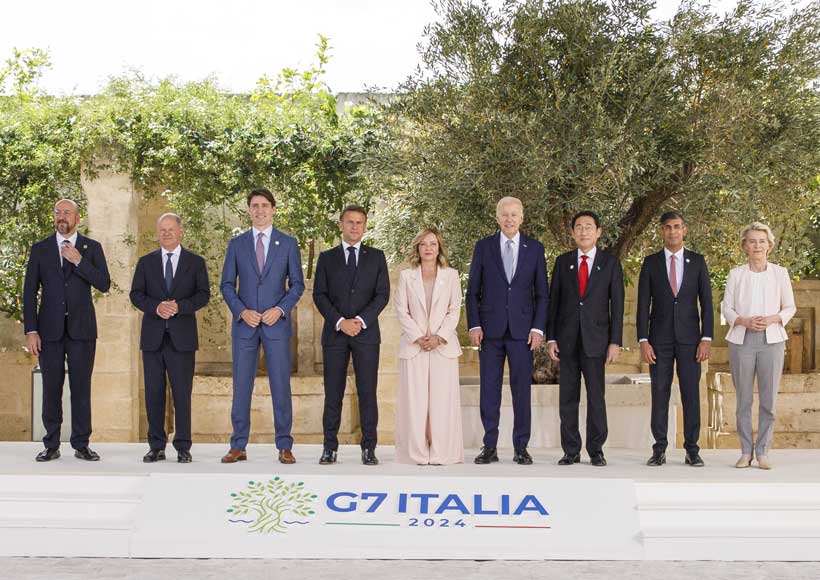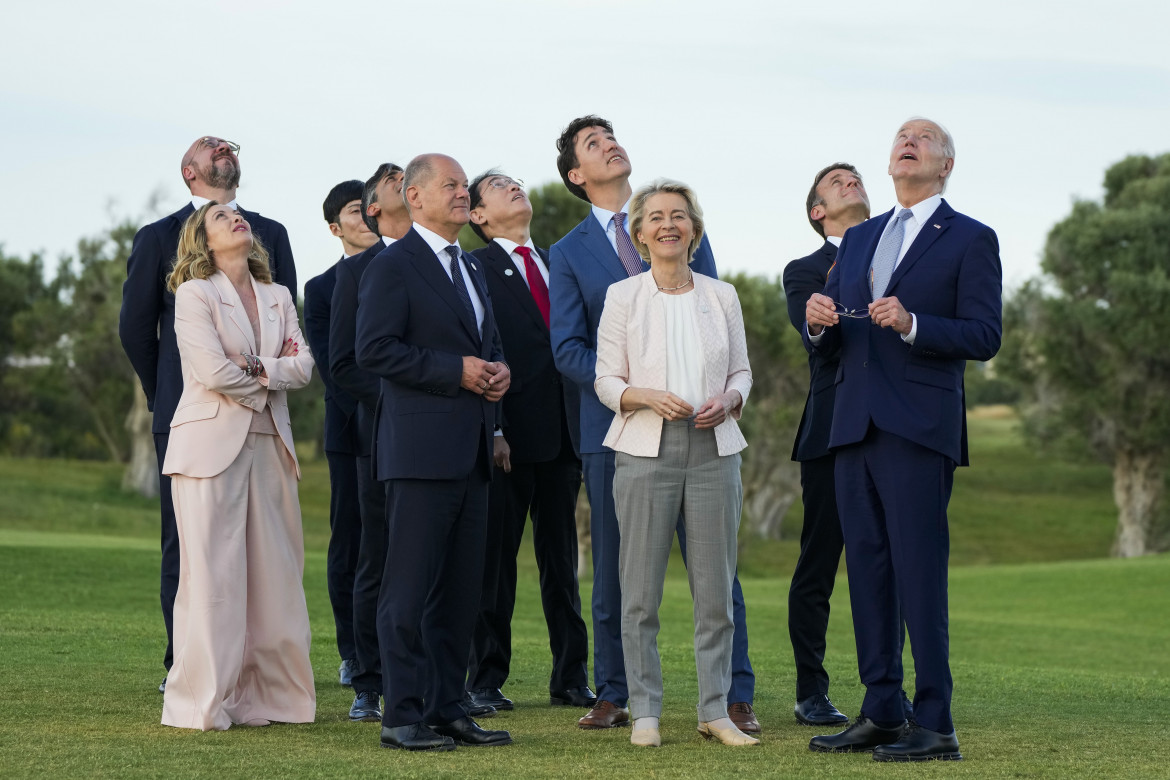The recent G7 summit in Italy concluded with an official statement that underscored
key takeaways and ongoing challenges.
BY PROF. ENGR. ZAMIR AHMED AWAN
JUNE 18, 2024

The recent G7 summit in Italy concluded with an official statement that underscored key takeaways and ongoing challenges. While the summit aimed to address pressing global issues, it was evident that underlying political dynamics and strategic objectives, particularly regarding China and Russia, played a significant role. This analysis highlights the successes and shortcomings of the summit, as well as the broader geopolitical implications.
Key Takeaways from the G7 Summit
Focus on AI and Technology Regulation:
Italy, under Prime Minister Giorgia Meloni, prioritized the regulation of artificial intelligence (AI). Pope Francis, a former chemist, made an unprecedented appearance to advocate for AI regulation, emphasizing its potential harms.
Italy’s temporary ban on ChatGPT in March 2024 showcased its proactive stance on AI scrutiny.
Outreach to Non-Western Nations:
The G7 attempted to broaden its engagement beyond Western democracies by inviting leaders from India, Brazil, South Africa, Turkey, Saudi Arabia, Argentina, Algeria, Kenya, and Mauritania. This move aimed to bridge the “West vs. the Rest” gap, especially concerning the Ukraine crisis. It was an attempt to expand blocks beyond West and take some other emerging powers on board.
Financial Sanctions on Russia:
A core issue was the proposal to use dividends from frozen Russian assets to support Ukraine. This proposal, initiated by Washington, faced opposition from European members and Japan. The debate highlighted the complexities of international financial sanctions and the geopolitical tug-of-war over their implementation. Some of the US allies were of opposite views and President Joe Biden failed to convince them.
Failures and Criticisms
Geopolitical Motives and US Hegemony:
The summit’s agenda appeared heavily influenced by the US’s strategic objectives to counter China and Russia, raising concerns about the G7 being used as a tool for US geopolitical dominance.
The exclusion of Russia since the 2014 G8 shrinkage to G7 and the recent focus on isolating China reflect a shift from economic cooperation to big-power rivalry.
Out of 7, six leaders were having domestic issue at home and were not strong enough to make a solid contribution at the Summit. President Biden, who is going to have a tough election by the end of this year, was losing his popularity within American voters. He might face very tough competition from former President Trump. He is equally unpopular globally for his irrational support to Israel and genocide in Gaza. Furthermore, during his tenure, Afghan debacle, Ukraine War, Gaza Genocide, and de-dollarization happened, making his presidency a weak and failure. French President is also going for election soon. Canadian Prime Minister, who is very much popular globally, but, may face very tough completion at home from opposition. Japanese Prime Minister is one of the weakest prime Minister in the history of Japan. German Chancellor is also facing domestic issues. I think only Italian Prime Minister was strong and enjoying full support of his people. Under this scenario, the six leaders were not in a strong position to contribute something solid at the G-7 summit.
Divisions Among G7 Members:
The inability to reach a consensus on using Russian assets for Ukraine highlighted fractures within the G7. European and Japanese resistance to US pressure revealed underlying tensions and differing priorities among member states.
The lack of agreement on this financial issue demonstrated the limits of G7’s cohesion and effectiveness in addressing complex global challenges. Some of the US allies were of opposite views and President Joe Biden failed to convince them.
Perception of Selective Human Rights Advocacy:
The summit’s approach to Russia’s financial assets raised questions about the selective application of human rights and international law. Critics argue that such actions undermine the credibility of Western institutions and set a dangerous precedent for future geopolitical conflicts.
The G7’s stance risks alienating non-Western countries, especially those involved in BRICS, by demonstrating a willingness to violate international norms for strategic gains.
Emerging Counterbalance: The Rise of BRICS
Expansion and Single Currency:
The BRICS bloc is gaining momentum as a counterbalance to the G7. The upcoming BRICS summit in Kazan, chaired by Russian President Vladimir Putin, aims to expand membership and create a single currency to facilitate economic relations amidst Western sanctions.
The development of an independent payment system for BRICS countries reflects a strategic move to reduce reliance on Western financial systems and mitigate the impact of sanctions.
Diverse and Open Partnership:
BRICS emphasizes an inclusive and non-bloc partnership, contrasting with the G7’s perceived elitism. This approach is attracting numerous countries, with around 30 seeking BRICS membership, indicating a shift towards a more multipolar global order.
Challenge to Western Hegemony:
The BRICS initiative to create a viable structure for economic cooperation and resilience against Western pressure signifies a growing challenge to US and Western hegemony. The group’s focus on mutual interests and equal dialogue contrasts sharply with the G7’s current trajectory.
Navigating Uncharted Waters
The G7 summit in Italy highlighted the group’s attempts to address global issues while navigating complex geopolitical landscapes. However, the summit also exposed the inherent contradictions and challenges within the G7, particularly its alignment with US strategic interests and the resulting divisions among members. The movement for European Sovereignty is gaining momentum too. As BRICS continues to emerge as a formidable counterbalance, the international community faces a shifting dynamic where traditional Western-led institutions must adapt to a more multipolar world order. There are almost 100 countries interested to join BRICS in the near future. The future of global cooperation will depend on the ability of these blocs to reconcile their differences and work towards inclusive, sustainable solutions.

No comments:
Post a Comment